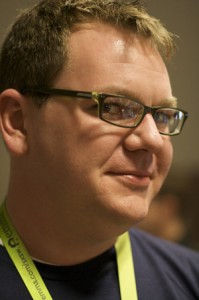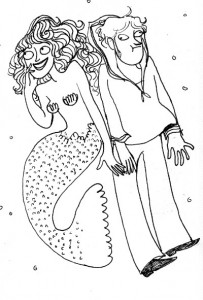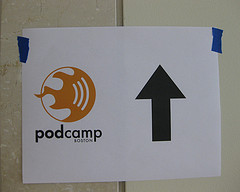
I love this creative use of Facebook by an Ikea store in Sweden.
Past editions of Voice Mail, Beth Dunn's newsletter on writing and voice.

I love this creative use of Facebook by an Ikea store in Sweden.

[caption id="attachment_979" align="alignright" width="199" caption="7th Son: Descent - Special Edition DOWNLOAD"]

What is it that you can do that others can't? What do you think is like falling off a log, it's so damn easy?
Why aren't you selling that?
No, really. Why not?
It seems like the simplest advice in the world:
But you'd be surprised at how often you (yes, you) ignore this basic truth.
Here are some of the things you like to tell yourself instead:
It's this last one that I think lies at the heart of most creative people's problems with making a living by doing what they do best: you think that "work" should be "hard."
We have a hard time wrapping our heads around the idea that work -- work that you get paid for and everything! -- can be fun, can come naturally, can be truly enjoyable, day in and day out.
Or we get caught up in "filling in the gaps" -- working like mad to balance our "soft" skills with "hard" ones.
(How come we always think the things we can do are "soft," but the things that we can't are "hard?" Let's stop doing that.)
Sure, you're a good painter, but you should really get better at accounting, so you can do your own bookkeeping.
Sure, you're a great writer, but you should really learn how to code websites, so that you have a "marketable skill."
Nonsense.
Do what comes easy. Do what you love. Find the people who need that thing. Sell it to them.
It's really, truly OK to make a living doing what comes naturally. I promise.

This week people of all ages are returning to school, which means that lots of folks are thinking harder than usual about what they want to be when they grow up, and how they might reasonably try to get there.
I thought it would be a good time to talk to someone who seems to me to be doing it right, in terms of making a living as a creative person, on her own terms and in her own way. People like this inspire me, and I think it's good to keep their stories in mind as we forge our own creative paths.
What follows are excerpts from an interview I did recently via email of the author of my very favorite webcomic, Hark! A Vagrant!
Kate Beaton lives in Halifax, Nova Scotia, and she writes one of the funniest and, yes, most erudite webcomics out there, Hark! A Vagrant!
She is clearly fascinated by history, especially of the Canadian, American, and European variety, and her comics present a quirky, often hilarious take on the many topics in this rich vein of content.
Her interests include the American Revolution (click on the images to enlarge*):
Naploeon's fateful campaign on Russia:
Robespierre and the French Revolution:
And, of course, Jane Austen:
Kate earned her undergraduate degree in History and Anthropology at Mount Allison University in New Brunswick, Canada. She began drawing comics for the university newspaper during her 3rd and 4th years at school, but then stopped after graduation. She picked it up again after about two years, when she started what would eventually become Hark! A Vagrant!
After showing her growing catalog of new comics to her closest friends, she was eventually persuaded to start posting them online. Now she lives in Halifax, where she earns her living primarily from her webcomic, its related merchandise, and other artistic projects.
I asked her how the process of posting her art online and making it public had changed the style and content of what she did:
Well, the style has changed because I've been drawing consistently since I began the comic. It's improving, I'm happy with that. As for content, I used to do more personal things, journal comics and inside jokes because it was just myself and my friends reading the comics. That mostly went away with a bigger audience, no one wants to read a comic about pointless inside jokes.
One of the striking things about the world of webcomics is the tightly-knit support network they have formed. There is a tremendous amount of cross-promotion and publicity that goes on among the emerging crop of webcomics artists, and they seemed to embrace Kate's endeavors right away:
When I started, I got a lot of encouragement, and that was a big boost. Online comics artists are often friends in the same way that any peer group would be, they do the same things, have similar interests and experiences, and are usually fans of other creators too. There were a lot of people helping me who I became friends with - Emily Horne, Joey Comeau, John Campbell, Ryan North, Richard Stevens, Meredith Gran, John Allison, Jeff Rowland - a lot.
What do you do during a typical day, now that you are back living in Halifax and making your living from your art?
I've yet to settle in to a typical day here in Halifax, it's been such a busy summer and I've hardly even been around. But days vary widely, sometimes it's all reading one day, sometimes it's making comics and failing, sometimes it's making comics and getting it right, sometimes it's making comics for other things, sometimes it's answering mail. Sometimes it's all of those things!
I noticed that on some of your earlier strips, you wrote in a line at the bottom that says something along the lines of "this is so dumb." I think it's a common thing for creative people to do, metaphorically or otherwise, to hang self-deprecating disclaimers on their work. This practice, as you know, has a number of drawbacks. What advice would you give to other creative people who do this?
Don't do that. I've done it once or twice under something that is especially ridiculous, but I still put it up, it's funny because it's so bad, people enjoy it. But you see a lot of people putting stuff up and saying about it "this is my shitty comic" or making excuses like "oh I only did this in 10 minutes so that's why it's so bad." They're scared people will make fun of what they are doing, but you have to put it out there, you have to let people judge for themselves. If it's bad, it'll get better in time, that's the way it always is.
Where did you get such a sinister view of mermaids?
Mermaids were always sinister, they drowned sailors!
Who do you think really killed the princes in the tower?
Henry Tudor, baby
The lessons I take from my interview with Kate are the usual reminders of how to live a creative, satisfying life:
In short, share your actual, authentic self with the world, and don't worry about the traditional or approved way of going about things. Find other people who share your take on things, and support them. Follow it where it goes.
What do you think? Who inspires you?
*All images reproduced with permission from the author. All images are copyright of Kate Beaton.

I had a great conversation the other day with Michael Katz, author of the blog It Sure Beats Working. He mentioned something to me on the phone that he later blogged about:

This summer was something else altogether, and it's hard to say why. I certainly didn't see it coming.

One of the toughest things to overcome is the idea that play is necessarily separate from work. From this unfortunate fallacy, we tend to derive the idea that work is necessarily hard and play is necessarily easy.
Where does that leave those of us who are creative for a living?
Some look at creative workers, for instance, and think that they must have it incredibly easy, because what they do looks like "play" to many. That's the life, they think. Easy money.
Creative workers themselves can fall prey to this kind of thinking, when they fail to price their work -- or even value their work -- at the level it deserves. Because they sense that there is a strong element of play in their work, they find it harder to classify their products as "work" at all. This isn't real work, they think. It can't be worth that much money.
As I mentioned in a recent post on this topic, the bias against classifying creative work as "true" work goes deep. But the most successful among us realize that there is no real split between work and play. They are only separate when we agree to pretend that they are. We are complicit in this pretense all the time. And it hurts all of us.
I'm planning on starting a series of profiles of creative workers who successfully integrate work and play, so that we can see this magic trick in action. If you'd like to suggest someone who you think exemplifies this idea, please let me know. I'm officially taking requests.
Some parting food for thought, from the always thought-provoking Copyblogger:
Allowing your mind to be at play is perhaps the most effective way to stimulate creative thinking, and yet many people disassociate play from work. These days, the people who can come up with great ideas and solutions are the most economically rewarded, while worker bees are often employed for the benefit of the creative thinkers.
You’ve heard the expression “work hard and play hard.” All you have to realize is that they’re the same thing to a creative thinker.

I was in beautiful Provincetown on business this afternoon, which is a pretty nice thing to be able to say. Provincetown is breathtaking throughout the year, but today was a day made for the chamber of commerce: 74 degrees, clear sunny skies, light breeze coming in off the harbor.

Podcamp Boston 4 just ended, which means, really, that another year has just begun.
Podcamp is always a profoundly motivating and inspiring experience for me, and I have actually begun to track major changes in my life based on how they have spun around the axis of Podcamp, which always seems to serve as a hinge in time, often even as an active wedge for change.
So, to paraphrase a friend's totally legitimate question to me this weekend:
What is the point of Podcamp?
I am always somewhat taken aback when someone says something about Podcamp being mostly about podcasting; I had sort of forgotten that that was the weekend's alleged subject matter. And in a way, I guess it is about podcasting, along with other related topics. If you were to look at a list of the session topics, you might come away thinking that the conference is nothing but the nuts and bolts of podcasting, SEO, Twitter, and other "social media" type esoterica.
And, to a certain extent, it is.
But only on the surface. For me, podcasting is really just a front for Podcamp, it's only the skin of it, it's just the flashy neon sign that hangs out in front while the real card game goes on inside.
In fact, Chris Penn, one of Podcamp's founders, writes eloquently about this essential nature of Podcamp here. And it's something of what I touched on when I reflected on my experience at NewBCamp in Providence last year.
There's something a bit more profound going on at Podcamp, and it has nothing to do with learning about what type of microphone works best for two-person interviews.
Chris Penn articulates it as a sense that we are capable of greater things, that we can in fact do things that other people tell us are impossible, improbable, and even unseemly. It's true: there's something unbelievably powerful about how Podcamps encourage everyone to participate -- but not just to participate, to pass it on, to encourage others to participate as well. It's all part of the "Everyone is a Rockstar" ethos of Podcamp, and it's sort of breathtaking to watch it in action.
Example 1
At one of the sessions I attended, a packed room of people sat and waited patiently for the presenter to arrive and begin. When it was ten minutes after starting time, somebody suggested that perhaps the presenter was a no-show.
Suddenly, four people were at the front of the room, volunteering to improvise a presentation on the exact topic that was originally scheduled for that session. They worked out a division of labor, each of them agreeing to talk about an aspect of the topic that they were particularly strong in. Within two minutes, we were up and running with, I am convinced, an even stronger presentation than the one that had been planned.
I told this story to Chris Brogan (the other co-founder of podcamp along with Chris Penn) at lunch, and he just smiled and said That's so Podcamp.
Example 2
I went to several of the bigger sessions in the main ballroom, where the topics were huge and diffuse, things like "What's on our minds now?" Sounds like you get to listen in on a conversation between the big thinkers in the field of social media, right? Hear what they think is coming next, what they are sniffing in the air, with their special powers of discernment and understanding...
In fact, what these sessions consisted of was a Phil Donohue-style session of passing the microphone around from one participant to the other, giving anyone who wanted to the opportunity to speak their mind. Some people talked about marketing trends, while others talked about how sick they were of hearing about marketing, when it was relationships that really mattered; some talked about iPhone apps they would like to see developed, while others talked about the everyday violations of online data privacy and security that iPhones can now enable; some talked about how we all need to cool it on our collective narcissism and obsession with personal branding, while others suggested that we would be sunk if we didn't work hard on our personal branding over the next year.
Fascinating.
Example 3
In his reflections on this year's Podcamp, Chris Penn wrote about breaking the shackles of your own potential, about swinging away at our own "chains of doubt and fear." At last year's Podcamp, I was still dithering over whether or not I would jump with both feet into an MBA program that would require an hour-and-a-half commute each way, that would challenge my self-concept in ways that made me more than a little uncomfortable, and that I suspected would require me to leave my job and find new sources of income that didn't come with the comfort and security of a salary. When I attended Podcamp last summer, I spoke with several people who, each in their own way, helped me make the hard decision to jump, and jump wholeheartedly, without fear or hesitation.
When I ran into one of those friends again at this summer's Podcamp, he asked me how my leap was going, and where it had taken me. When I told him, he said that I should consider myself Exhibit A of how change can bring us places we never thought we could go, and how it can help us cover distances in a year that we thought would take a lifetime.
My story of change is somewhat similar to the one Chris tells about Chel, who was the lead organizer for Podcamp this year. Chel is really Exhibit A, but there's no reason why we all can't be.
So what is the point of Podcamp?
People.
I am not saying that Podcamp is about some airy concept of personal change and growth and self-fulfillment. It's much, much scarier than that. Podcamp is about taking responsibility for your own experience. It's about choosing to be the author of your own life, with all the blame and glory that goes along with that. It's about realizing that your responsibility for your self is not just a duty to be all you can be, or whatever, but it's also a duty to the community.
Because we need you to do that awesome thing you've been considering, even if it is just a Big Huge Hammock in Boston Common.
Because we need you to remind us that our lives can be centered around work that we are passionate about.
Because we need to see you do the impossible, so that we can begin to believe that we can, too.